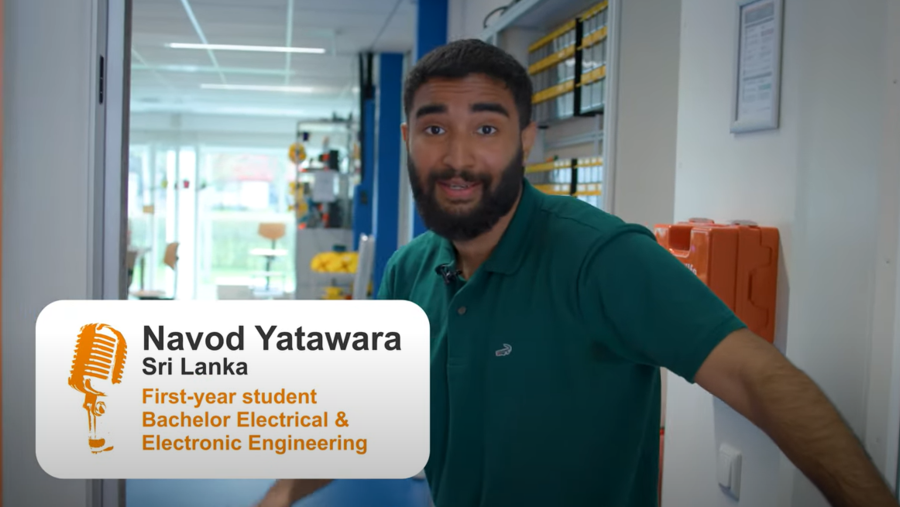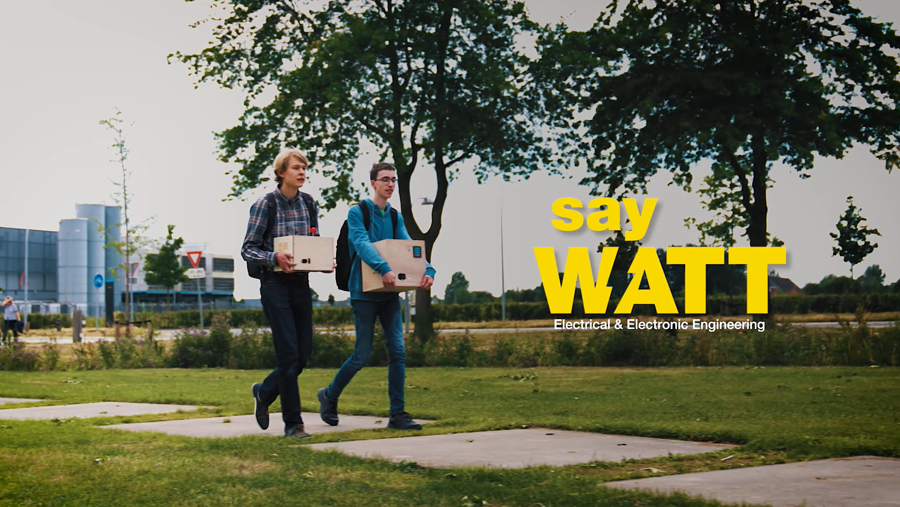Your engineering skills are indispensable for the energy transition
Check whether you qualify- Bachelor
- Full-time
- 4 years
Your engineering skills are indispensable for the energy transition
Check whether you qualify
The energy network of the future requires engineers who devise new concepts for transporting, converting and storing energy and regulating supply and demand more intelligently. Will you come up with the crucial solution for the flexible application of (sustainable) energy? Will you design the drive system and electric motor for a solar car? With the Energy & Power Electronics specialisation, you focus on the technology that makes the energy of the future more sustainable, better and smarter. This is what you will find with us:
✔ Programme developed jointly with the business community ✔Passionate, driven groups ✔ Great job prospects
You have a lot of choice within our Electrical Engineering programme. In the first two years you can add your own flavour to your studies by choosing a number of elective subjects, and you lay the foundation for your specialisation in your third year. In addition to the Energy & Power Electronics specialisation, you can also opt for a Mechatronics or Sensors & Smart Systems specialisation. Whether you want to work with technology for the energy transition, moving systems or smart electronics – you will find the programme at Hanze!
What makes studying at Hanze UAS unique is that you will work on projects for real clients and contribute to concrete solutions for current issues impacting society. Below, you can find some examples of projects our students engage in.
The Energy & Power Electronics specialisation is one of the three specialisations of the Electrical Engineering programme. The Energy & Power Electronics specialisation focuses on the energy system of the future and electronics for high power.
During your education you will develop knowledge and skills in everything in the field of electrical engineering. For example, you will work on robotics, programming, control systems and data communication. You will immediately start working on assignments from real clients in the field and have plenty of room to organise your own studies.


You will be introduced to the versatile, fascinating and broad world of electrical engineering. You do this with all new Electrical Engineering students. You will learn to design, build and program analog and digital electronics. In the meantime, you will lay a solid foundation in the mathematics and physics needed to understand electrical engineering. And of course you will apply everything in projects with your fellow students - such as building an electronic game or a robot. With electives such as sustainable energy technology or applied mechanics, you can discover which specialization you like best.
Do you discover during your first or second year that you prefer a different direction of Electrical Engineering (Sensors & Smart Systems or Mechatronics)? No problem! You can just switch!
Here you will continue to lay a broad foundation in electrical engineering. But now no longer with separate courses, but in 4 periods, where everything you learn in that period comes together in a project. You will work on building your own control system, creating a dashboard for a customer in which you will show live, remotely measured data and creating an improvement plan for a drive system.
To conclude and highlight the year, you will design and build your own robot. But this time you will approach it from your own specialization. You can choose whether you will focus on designing a PCB or if you will focus on choosing the right sensors and processing the data provided by the sensor or if you will focus on all the moving parts needed to be able to move forward and pick up blocks (packages).
In years 3 and 4 you have a lot of freedom, because you can determine the order of the following parts of your programme yourself:
Internship
You will work for a company of your choice in the Netherlands or abroad) for six months to put all the knowledge and skills you have acquired into practice. You do this by working on your own assignment under the supervision of a supervisor from your internship company.
Specialisation
You will work on the specialisation of your choice for six months. You can choose between Energy & Power Electronics, Sensors & Smart Systems or Mechatronics. Here you will acquire the specialisation that prepares you for the field of electrical engineering in which you are interested.
Free Elective Space
Here you can go wild and do what you like. You could follow six months of education abroad, or at another university of applied science in the Netherlands, or at the Hanze. And for your free elective space, you can choose whatever topic you want to study. You could delve deeper into Electrical Engineering by doing a second specialisation, but you could also study a language abroad for six months.
You will graduate at the end of the fourth year. You will choose a company that has an interesting issue that you can turn into a graduation assignment. Next, you will conduct research for the company for six months and come up with an innovative, smart solution that will benefit the company. During your graduation you will show that you are the independent professional that the field is so eagerly waiting for!
After your bachelor's degree in Electrical Engineering, you can continue studying for the title of Master of Science by taking a master's programme. For example, you can choose to follow a subsequent master's degree at Hanze University of Applied Sciences, such as our Masters in Smart Systems Engineering or Renewable Energy. You can also continue your studies at another university, for example the University of Groningen (RUG).
Students of the Electrical Engineering programme who pursue a master’s degree often choose:
After the Bachelor's degree in Electrical and Electronic Engineering you will be awarded a Bachelor of Science degree and you will be able to work for companies and (research) institutions. 89% of graduates find their first job within a year. A large part of the alumni stays employed in the region, a small part is working abroad. Examples of positions are:

Enrollment advisor
Zernikeplein 11, 9747 AS Groningen